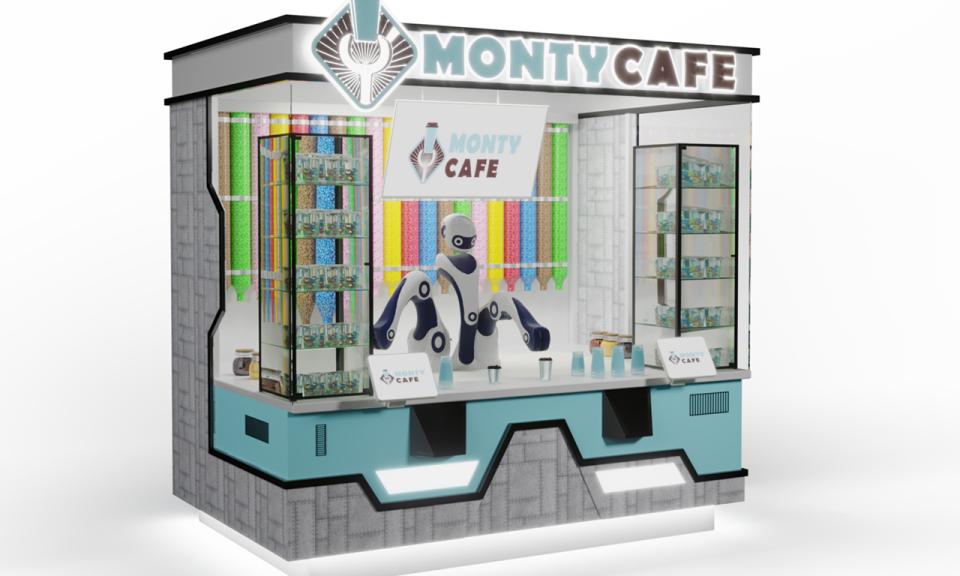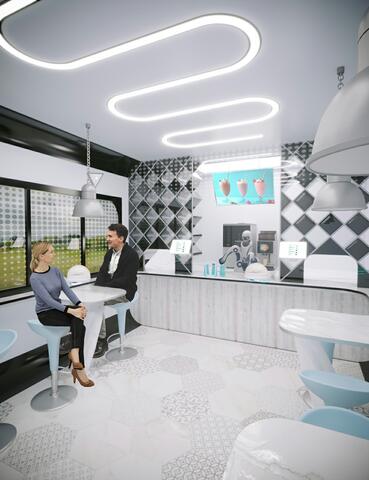
Published
Blog type
As the recent global pandemic has forced us all into lockdown and hospitality, offices, shops etc to close, maybe it is time to think of a new way forward. And could this new normal of the socially distancing future, be serviced by robots? Pavel Zhdanov (MSc Risk Management and Financial Engineering 2008) thinks so.
Meet MontyCafe; serving coffee, drinks and sweet treats, anywhere from shopping centres to airports and offices, servicing up to 60 cups an hour and fully autonomous. Could this be the solution to café of the future? Pavel is founder of GBL Robotics and MontyCafe, which develops ‘service robots with human oriented interface, autonomous navigation and speaking 20 languages.’
What gave you the idea for your business?
My company has been selling robots worldwide for 4 years and frequently received feedback from clients about the features they wanted/dreamt of. So, we decided to start developing our robots to better suit our client’s needs. For example, banks told us they wanted to make internal communication easier simplifying tasks such as booking rooms, displaying contact lists and help controlling climate with temperature, humidity and light censors etc. In HR departments robots can answer a lot of questions regarding terms of work, therefore freeing up the time of managers and staff. As for the hotel industry robots can help with check in/out, ask for feedback from customers or even order a taxi!
Tell us about MontyCafe
We have been developing this robot for 2 years and started installations from the 2019. Currently we have had 4 units in Moscow, several units sold for exhibitions and installed several kiosks around the world. Our units in business centres have been very popular servicing coffee. We are using high end coffee machines, fresh milk and good quality beans, so clients get coffee shop quality instead of vending machine taste. Nearly everybody who uses the café takes a photo or video of our robot, and children stand and stare – it is a real talking point!

What’s next?
We have already expanded and have a couple kiosks in Seoul and San-Francisco. We are also preparing to dispatch units to Cambodia and Abu-Dhabi. However we don't have yet installations in Europe or in the UK, where we estimate there is a good potential market with so many coffee lovers.
Right now our robot can serve all types of coffee, several different ice creams with toppings, soda and sweets. We are releasing mobile app soon, so that people can make online orders and send selfies to print on coffee foam. We are in process of working out fully robotic cafe with robot barista, automated dispenser system for deserts, bakery and special order delivering shuttles inside the tubes to customer tables. Of course, all orders will be placed through an app. Initially we estimate the cafe will be 20-30 sq m and 5-6 seating spaces as a trial, but in the future we plan to come to real restaurant formats. This might be the café of the future if social contact continues to be limited.
What's next for robotics?
The current global pandemic, COVID-19, has sped up the development and implementation of new technologies in different spheres. For example the way we set up ultraviolet lights to disinfect orders terminals after each order. Robots are starting to appear in our daily life more and more frequently, but some of the technologies are still quite expensive to implement. This is why we decided to develop a robot by ourselves in order to meet about 1 year ROI, in the case of the kiosk format and make robots more accessible to people. So, I think more robots will appear in our lives and start compete for working places where easy and repeatable actions are required.
This might be the café of the future if social contact continues to be limited.
Are robots putting people out of work?
We are frequently asked this question and our reply is that robots have been in our lives already for a long time. For example car manufacturers have robots running whole factories. Sometime ago producers realised advantages such as constant quality, less risk and economic efficiency compared to people. The similar situation will appear in every day services such as driverless cars, food services, cleaning or even medicine. But I don't believe robots will take over creativity jobs, for example chefs who create arts of work, or replace that social interaction between a bartender and a customer.
How did you time at Imperial help you?
I can say it opened new doors for me and my understanding of the way to build international company. Good connections with students from different countries and different backgrounds really helps in developing project in other markets. Also, the good financial background that I got during my education at Imperial allows me to communicate with businesses in the language of numbers, which is basically at the core of any venture.
